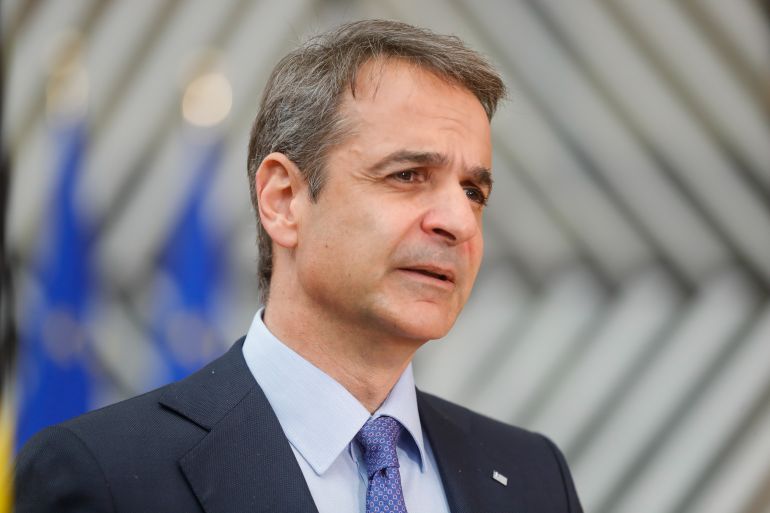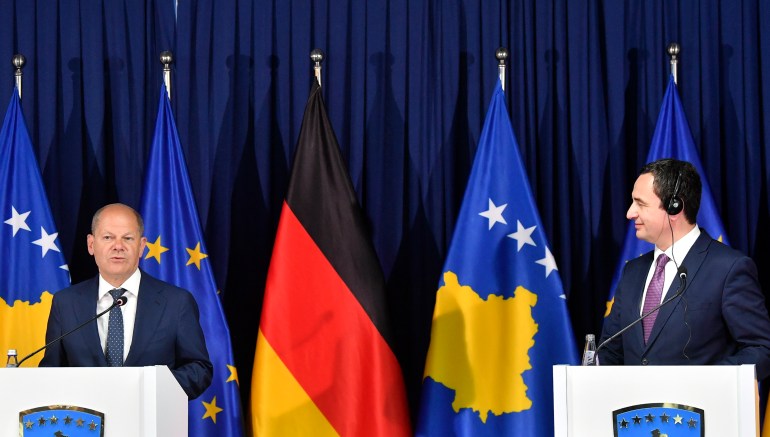Greek PM says EU must integrate Western Balkans by 2033: Politico
Mitsotakis says the EU needs to prove that when ‘it sets out a vision it has the intent and the capacity to follow through’.

Greek Prime Minister Kyriakos Mitsotakis has said the European Union should offer the integration of all six nations of the Western Balkans into the EU by 2033 in what he called a “bold but necessary step”.
Russia’s full-scale invasion of Ukraine has lent a new sense of urgency to the need to tie Montenegro, Serbia, Albania, North Macedonia, Bosnia and Kosovo closer to the 27-member EU, in part to counter growing Russian and Chinese influence in the region.
Keep reading
list of 3 itemsKosovo, Bosnia call for NATO membership as war rages in Ukraine
As EU hopes fade, Russia, China fill voids across Western Balkans
The link could entail full membership or an alternative community.
In an article published on Friday in Politico ahead of a summit in Greece of the South-East European Cooperation Process (SEECP), Mitsotakis said the EU needs to prove that when “it sets out a vision it has the intent and the capacity to follow through”.
The vision of EU accession for the region, he said, has become “blurry, fading in the eyes of frustrated and disillusioned citizens” as EU expansion has stalled in recent years over security, governance and migration concerns.
An EU-Western Balkans summit is scheduled on June 23.
“My message today is clear: In accordance with set criteria, let us offer the integration of all of the Western Balkans into the EU by 2033 – an ambitious but achievable timeline. This is long overdue,” Mitsotakis said.
“The first step must be a decision in two weeks’ time in Brussels to unblock the path of North Macedonia and Albania.”

Also on Friday, Kosovo’s Prime Minister Albin Kurti said his country would formally apply to join the EU at the end of the year.
“We still aspire to the status of EU candidate and we plan to apply at the end of this year,” Kurti said after meeting German Chancellor Olaf Scholz. “Europe is our destiny. Europe is our future.”
One of the biggest stumbling blocks for its EU ambition is tensions with neighbouring Serbia, from which Kosovo broke away in 2008.
Most EU countries recognise its independence, but Serbia and its allies Russia and China do not, effectively blocking Pristina from a seat at the United Nations.
EU-brokered dialogue between the two Balkan neighbours, launched more than 10 years ago, has so far failed to achieve normalisation of their ties.
Scholz called for progress in negotiations between the former foes.
‘Regional stability’
Kosovo and Serbia must “find a political solution with a comprehensive, sustainable agreement that also contributes to regional stability”, Scholz said after his talks with Kurti.
It is Scholz’s first visit to the Western Balkans since he became chancellor in December last year.
“Through their support of all measures and sanctions, Albin Kurti and the government of Kosovo have shown that Kosovo, as a reliable partner, stands closely by our side, and by the side of the European and international community,” Scholz added.
On a “blitz tour” through the Balkans, Scholz will also visit Belgrade and Thessaloniki Friday, followed by trips to North Macedonia and Bulgaria the next day.